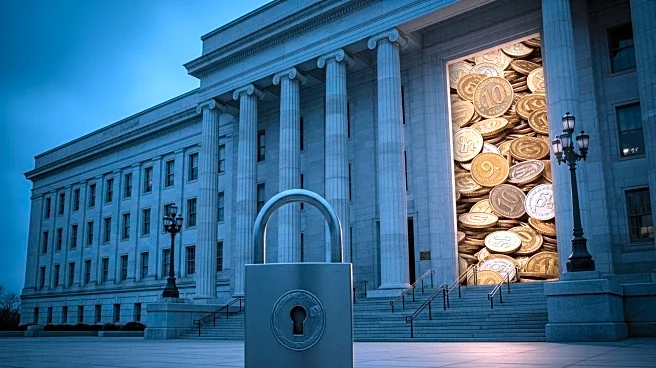What's Happening?
The Committee for a Responsible Federal Budget (CRFB) has criticized the recent government shutdown, labeling it as 'pointless and wasteful,' while revealing a $1.8 trillion federal deficit for fiscal year 2025. This deficit, reported by the Congressional Budget Office, highlights ongoing concerns about the nation's fiscal path amid political gridlock. President Trump has promoted economic growth and tariff-driven stimulus as solutions to the national debt, but economists warn these tariffs act as a tax on consumers. CRFB President Maya MacGuineas emphasized the need for fiscal discipline, proposing measures such as extending discretionary spending caps and enforcing a 'Super PAYGO' rule to manage spending.
Why It's Important?
The revelation of a $1.8 trillion deficit underscores the urgent need for fiscal reform in the U.S. The CRFB's criticism of the government shutdown reflects broader concerns about political inefficiency and its impact on economic stability. The deficit poses risks to the country's financial health, potentially affecting interest rates, inflation, and the nation's ability to fund essential programs. The CRFB's call for a fiscal commission to reduce deficits to 3% of GDP highlights the necessity for bipartisan cooperation to enact sustainable fiscal policies. Failure to address these issues could jeopardize the U.S.'s status as a global economic leader.
What's Next?
The CRFB has proposed several measures to instill fiscal discipline, including extending discretionary spending caps and enforcing a 'Super PAYGO' rule. These proposals aim to encourage fiscal responsibility and reduce the deficit. Additionally, addressing long-term entitlement program insolvencies, such as Medicare and Social Security, is crucial to prevent financial depletion. The CRFB's recommendations may prompt discussions among policymakers and could lead to legislative action to stabilize the nation's fiscal trajectory. The ongoing political gridlock, however, poses challenges to implementing these reforms.
Beyond the Headlines
The deficit revelation and government shutdown highlight deeper issues within U.S. governance, including political polarization and inefficiency. These challenges not only affect fiscal policy but also undermine public trust in government institutions. The CRFB's emphasis on fiscal discipline reflects broader concerns about the sustainability of current economic policies and the need for long-term planning. The situation calls for a reevaluation of priorities and a commitment to bipartisan cooperation to address the nation's fiscal challenges.










